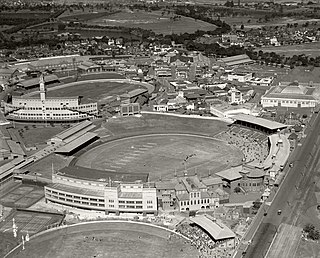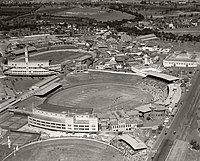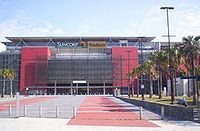The 1960 Rugby League World Cup was the third staging of the tournament and the first Rugby League World Cup to be held in Great Britain. The same format as used in 1957 was used, with a group stage leading to a final table.
The fifth Rugby League World Cup was held in Great Britain in 1970. Britain, fresh from defeating Australia in the Ashes during their Australasian tour earlier in the year, were hot favourites, and won all three of their group stage games, including defeating Australia 11–4. All the other nations lost two games each, and Australia qualified for the final largely on the back of an impressive tally of points against New Zealand.

The 1975 Rugby League World Championship was the seventh tournament for the Rugby League World Cup. The format differed from that employed in previous competitions; no single country hosted the matches, which were spread out in a 'world series' hosted by each of the five participating nations over a period of just over eight months. Each team had to play the others on a 'home and away' basis. Great Britain were split up into separate England and Wales teams, taking advantage of a glut of Welsh talent in the British game at the time.
The 1985–1988 Rugby League World Cup was the ninth Rugby League World Cup tournament held and saw yet another change of format with competition stretched to cover almost three years. The national rugby league teams of Australia, France, Great Britain, New Zealand and Papua New Guinea played each other on a home and away basis. These matches were fitted into the normal international programme of three-match test series between the nations, with a pre-designated match from each series counting as the world cup fixture. The tournament culminated in the 1988 Rugby League World Cup final.

The France national rugby league team represent France in international rugby league matches. They are referred to as les Chanticleers or less commonly as les Tricolores. The team is run under the auspices of the Fédération Française de Rugby à XIII.

Bob McCarthy MBE is an Australian former professional rugby league footballer and coach. He played for the South Sydney Rabbitohs, Canterbury-Bankstown Bulldogs, New South Wales and for the Australian national side. He later coached in Brisbane, taking Souths Magpies to a premiership in 1981 and coaching the Gold Coast-Tweed Giants upon their entry to the Winfield Cup. Since 2001 he has been the chairman of both the Australian and NSW state selection panels.
The 1968 New South Wales Rugby Football League premiership was the 61st season of professional rugby league football in Australia. Twelve teams, including six Sydney-based foundation teams and another six from around Sydney competed for the J.J. Giltinan Shield and the WD & HO Wills Cup during the season, which culminated in a grand final between South Sydney and Manly-Warringah.
The 1967 New South Wales Rugby Football League premiership was the 60th season of Sydney's professional rugby league football competition, Australia's first. The introduction of the Cronulla-Sutherland and Penrith clubs saw a total of twelve teams from across the Sydney area compete for the J.J. Giltinan Shield and WD & HO Wills Cup during the season, which culminated in a grand final between South Sydney and Canterbury-Bankstown. This was also the first live televised broadcast of a football grand final of any code in Australia.
The New Zealand women's national rugby league team, also known as the Kiwi Ferns or New Zealand Kiwi Ferns, represents New Zealand in Women's rugby league. They are administered by the New Zealand Rugby League.
The 2013 Rugby League World Cup final was the conclusive game of the 2013 Rugby League World Cup tournament and was played between New Zealand and Australia on 30 November 2013 at Old Trafford, Manchester, England. Australia won the final by 34 points to 2 in front of a sell-out crowd, finishing the tournament undefeated. They reclaimed the cup from New Zealand, who had defeated them in the 2008 final. The Kangaroos won the Rugby League World Cup for the tenth time, and the first time since 2000. Their five-eighth, Johnathan Thurston was named man-of-the-match.
The England women's national Rugby League team represents England in Women's Rugby League. They are administered by the Rugby Football League. As Great Britain, they toured Australia in 1996, New Zealand in 1998, and reached the first-ever Women's Rugby League World Cup final in 2000, where they lost 26–4 to New Zealand.

The 2021 Men's Rugby League World Cup, was the 16th Rugby League World Cup, and one of three major tournaments of the 2021 Rugby League World Cup. The tournament was held in England from 15 October 2022 to 19 November 2022. It was originally due to be held between 23 October 2021 and 27 November 2021, but the COVID-19 pandemic and the subsequent withdrawals of Australia and New Zealand caused the tournament to be postponed. 16 teams competed in the tournament, an increase of two from the previous two tournaments and the first to feature 16 teams since the 2000 Rugby League World Cup.

The 1992 Rugby League World Cup final was the conclusive game of the 1989–1992 Rugby League World Cup tournament and was played between Great Britain and Australia on 24 October 1992 at Wembley Stadium in London, England. Australia won the final by 10 points to 6 in front of an international record crowd of 73,631. Australia, the defending champions, won the Rugby League World Cup for the 7th time.

The 1968 Rugby League World Cup final was the conclusive game of the 1968 Rugby League World Cup tournament and was played between Australia and France on 10 June 1968 at the Sydney Cricket Ground in Australia.
1995 Rugby League World Cup Group A was one of the three groups in the 1995 Rugby League World Cup. The group consisted of three countries: Australia, England, Fiji and South Africa.
This is a list of the squads which took part at the 1970 Rugby League World Cup.
This is a list of the teams which played the 1968 Rugby League World Cup.
Jean-René Ledru is a French former rugby league player, who played as wing, second-row.
The Rugby League World Cup is an international rugby league tournament currently played every four years. The first tournament was held in 1954, hosted by France who had pushed for such a tournament to be approved. Since the first edition, 14 others have been held at sporadic intervals.

The 2021 Rugby League World Cup (RLWC2021) was a collection of world cups in the sport of rugby league, held in England from 15 October to 19 November 2022. England won hosting rights for the competition on 27 October 2016. The bid received £25 million UK government support, partnered with the UK Cabinet Office as part of a commitment to the Northern Powerhouse, with 87 percent of all matches to be held in northern towns and cities. Organisers initially planned for the tournaments to go ahead between 23 October and 27 November 2021 despite the COVID–19 pandemic but withdrawals from Australia and New Zealand over "player welfare and safety concerns" caused the tournaments to be postponed – with the event's chief executive admitting that a World Cup without those teams would have lacked credibility.








